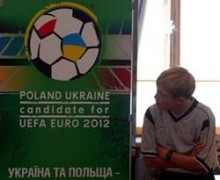The Day has been closely following Ukraine’s preparations for Euro 2012. So far we have heard mostly comments from members of the political leadership, individual politicians, officials from the organizing committee, and heads of the regional and city state administrations where the events will take place. However, ordinary Ukrainian citizens will be more involved in Euro 2012 than bureaucrats. They are the ones who will be building roads, bridges, and stadiums, and thousands of young people will work as volunteers during the soccer finals. Every citizen is thus forming his attitude to Euro 2012.
Since this soccer event has long been the subject of numerous discussions, a team of experts at the Kyiv International Institute of Sociology (KMIS) decided to ascertain people’s attitudes to Euro 2012. Below KMIS President Valerii KHARCHENKO comments on the findings of a poll carried out on Jan. 24-29.
Mr. Kharchenko, your findings show that 70 percent of people in western Ukraine believe that we will be able to host the European soccer finals on an adequate level. Sixty-four percent of people think the same way in the central part of Ukraine, but the numbers drop to 62 percent in the south and 54 percent in the east. How would you explain the differences in the percentages? Are they significant?
I think these differences are explained by the fact that people in eastern Ukraine do not trust the people who are in power and tasked with organizing the championships. All our interviews show that the level of confidence and positive expectations — Euro 2012 is a positive event for our country — is the highest among those respondents who voted for the ruling coalition. The only thing that’s better than during the elections is the fact that the percentages in the center and south are very close. This is proof that there is no boundary line separating people. Also, the difference between the indices in the west and east (70 and 54 percent) is considerably smaller than what we recorded during the elections of 2004, 2006, and 2007.
If the government changed, would these figures be the opposite of what they are?
I think so. If the White-Blue coalition came to power — although it’s difficult to speak about colors, considering that the previous coalition was colorful — western Ukraine would trust its ability to organize the soccer finals less than eastern Ukraine.
Was the question of how well people are informed about Euro 2012 part of your survey? No, it wasn’t, so our inference is that our respondents relied on what information they had at the moment.
Could it be that the level of information about Euro 2012 and attitudes to it are like those in regard to NATO — that people simply don’t have concrete information and have only heard certain things?
With regard to attitudes to NATO, let me stress that our people know very little about this organization. We conducted a special poll and the question was, “Do you think that you know enough about NATO to take part in a referendum?” Quite a few respondents stated that they knew little but were prepared to vote on this question. For those opposed to NATO, the main argument is the stand taken by Russia. They have a positive attitude to our northern neighbor and, unlike the western and central parts of Ukraine, which are more inclined to move in the direction of the European Union, they would prefer to join an alliance with Belarus and Russia. They don’t care what NATO is.
According to your findings, a mere four percent of respondents believe that there will be no cases of corruption during the construction and renovations of large projects. Seventy-six percent are sure that there will be cases of corruption and 56 percent believe that these will be major cases. What is the reason for this distrust?
It’s true that people don’t believe that there will be no corruption during the preparations for Euro 2012, and this attitude is the same from west to east. This attitude is characteristic of Ukraine and is shared by 72 percent residents in the west, 73 percent in the east, 75 percent in the center, and 81 percent in the south. People in southern Ukraine are most distrustful of the government’s financial and economic virtues. I think this is explained by all those scandals. Our polls show that people know from experience and the media that corruption is rampant in our country. That is the predominant opinion of the Ukrainian public.







